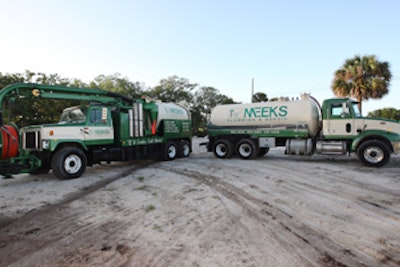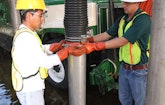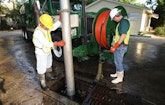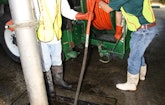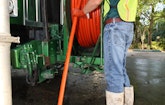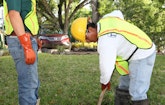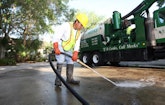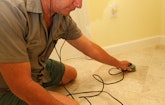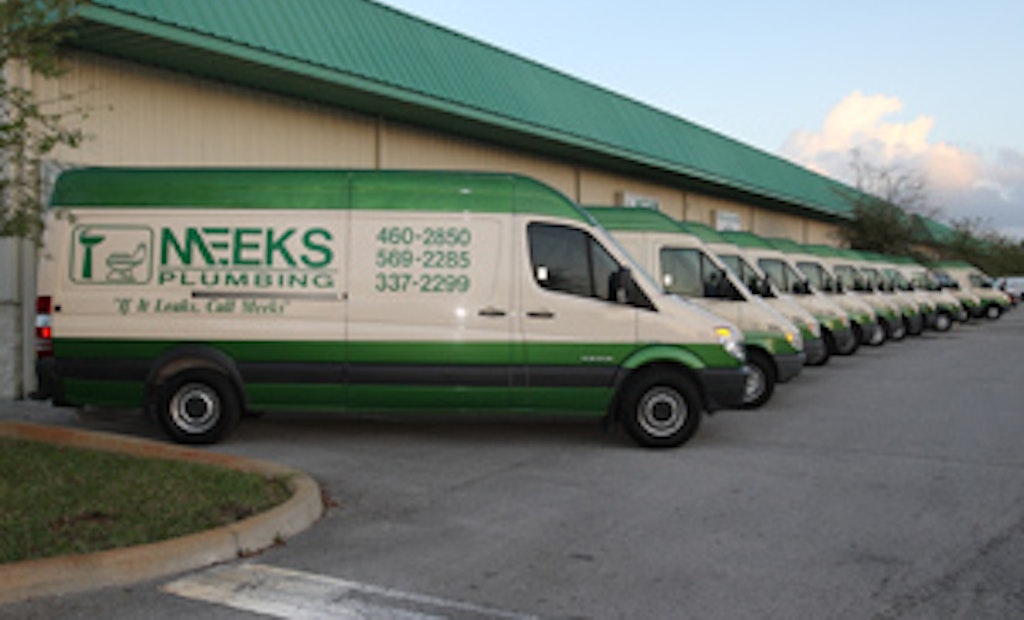
Interested in Location/Detection?
Get Location/Detection articles, news and videos right in your inbox! Sign up now.
Location/Detection + Get AlertsRonnie Meeks, owner of Meeks Plumbing, Inc. of Vero Beach, Fla., was well prepared when he realized things were about to change in the financial environment. He had built his business in this popular vacation community for 30 years, but as the market turned, he was in position to scale back.
At one point, Meeks employed 166. Today the company offers services to a broad range of customers with 19 technicians and 19 service vans, a combination truck, jetters and several excavators. On-site leak detection comprises a growing portion of their daily business.
Contract work has been vital to the success of Meeks Plumbing during a challenging time. They have provided service to municipalities for the past eight years and local school boards for 14 years. The company started out doing strictly new construction and began serving property management companies when they added plumbing services two years later in 1984. These important clients, along with traditional residential and commercial customers, have been a sustaining force for the business, keeping the doors open, phones ringing and the service vans on the road.
In 2003, Meeks saw another opportunity and added septic and grease service to the menu, as this provided another avenue to service the needs of their broad and expanding customer base.
More recent expansion in 2007 included the purchase of a Vac-Con vacuum truck, which has provided the opportunity to use hydroexcavation in situations where sewer lines must be uncovered without disturbing other utilities.
Attracting big clients
Ronnie Meeks considers the company’s contracts with the municipalities of Indian River County and St. Lucie County an essential component of his business. While not a large piece of the puzzle, they have a running purchase order with Indian River, where they basically provide emergency service to fire stations and handle backflow prevention work. They also handle Backflow Certification and repairs, in addition to plumbing problems and catch basin cleaning.
Meeks also has a contract for services with the City of Fort Pierce for backup services. “They often can fix a problem, but when they can’t get it fixed themselves, they will call us,” Meeks says. “They use us if their machines are down.”
Their work with municipalities, school districts, and property management firms and other commercial jobs now represent about 40 percent of their plumbing and drain business. Residential accounts for 35 percent of business, while the vac truck represents another 5 percent. The rest is comprised of septic and grease pumping and new construction.
“With residential customers, and we have a lot of those, we are not in the home on a regular basis. It might be once or even twice a year,” Meeks says. “With the other entities we serve we have a lot more interaction. These jobs separate the competition, because you have to have bigger equipment and be more specialized in order to handle the needs. Most plumbing companies do residential service, and don’t have the kind of equipment needed.”
In the classroom/on the property
Meeks general manager Scott Buday says services for school boards include work at public, charter and private schools. These are large districts, sometimes with 20 or 30 or even 40 schools, and they can run up to 20 acres on a site.
For larger school jobs, they like to visit the property before making a bid. For emergency work that isn’t necessary, as they have been working with the school properties for many years and are familiar with the situations.
“We can act pretty quickly and it’s easy for us to understand the needs of these customers,” Buday says.
At the private Saint Edward’s School, in Vero Beach, Meeks Plumbing provides most of the plumbing service work. They also clean storm drains and collect from grease traps.
“We have associations with school boards in Indian River County, St. Lucie County and Martin County,” Buday says. “The school districts are always building new schools and tearing down old buildings. But the older buildings not replaced do need our services. We will go in and look for broken lines. We do a lot of jetting of sanitary lines and deal with mainline stoppages. We do repairs on roof drains. We have issues with roof drains because a hurricane can come through and wreak havoc. Roofs are always a concern. We will replace lines when we find leaks. We also do some catch basin work with the schools.”
Buday notes that with the current economy, the school boards want to make necessary and adequate repairs, but they also keep a close eye on how a contractor goes about the work and the charges.
“They scrutinize how you do your billing and your pricing,” Buday says. “They want it spelled out clearly as to costs. They want to take care of the kids in school, but their budgets are greatly reduced.”
He explains that the school districts select three approved vendors they will do business with each year. Bids are submitted, and the district will chose a number one, a number two, and a number three contractor. Sometimes the number one contractor will have a lower price, but the least equipment and thus the least capability to perform some functions. Number two on the list might have more capability, and the third contractor could offer the widest range of services. The job itself usually determines which contractor gets the call. With emergency calls, districts will also consider past performance, pricing and type of equipment available.
Buday says that there are several things they take into consideration for preparing a special bid for a school district, including required time, materials, location of the school and when they want the work done.
“A lot of times we can’t work while school is in session. We might have to work late at night. A lot of it is timing more than anything. It depends on lead time – that might be two or three weeks.”
Tapping into tourist trade
Work with property management companies rounds out the specialty market for Meeks Plumbing, which has benefitted significantly from the addition of the Vac-Con.
Meeks says this is not conventional or typical plumbing service as these management companies cover everything from major hotels and condominiums to mobile home parks, and properties have to be maintained in excellent condition. The associations keep a close eye on the management companies.
“Very high end – very expensive,” Meeks notes. “Some of the companies represent at least 1,000 units. Some issues we deal with are broken lines, sewer mains, catch basins. This is much more than basic residential service.”
Meeks operates a fleet of 19 Dodge Sprinter super extended diesel vans, from 2003 to 2008. He particularly likes low mileage vehicles of this vintage as they offer better fuel economy than newer models. He says they are all single axle.
The Vac-Con is a 2002 International, and has a positive displacement blower with a 1,300-gallon water tank and an 11-yard debris tank. The water pump is rated at 2,500 psi/80 gpm. Their two pump trucks include a 2004 Peterbilt with a 3,600-gallon tank from Transway Systems, and a 1995 Ford L8000 with a 2,000-gallon steel tank.
Two Spartan jetters, a 758 Hydro-Jet and a 717 Electric Mini-Jet, and cameras from General Pipe Cleaners, MyTana, Ratech and RIDGID round out the inspection equipment. For locating they use five MyTana LD30 leak detector units, one RIDGID NaviTrack Scout and one NaviTrack 11.
They also utilize five Bobcat trackhoes, a Bobcat skid-steer loader, a Volvo EC35 mini excavator and a Ford 655C Extend-A-Hoe.
Dig and deliver
Meeks says they keep their excavators active because they fix spot repairs the old fashioned way, as lines are not buried deeply. They can be exposed expeditiously without the need to shore trenches for safety reasons, but when there is the possibility of running into telephone, electric, cable or other lines they turn to hydroexcavation to expose and repair.
Soils tend to be sandy in the areas they serve, but also they find Caprock in some regions, which is similar to limestone. Where they have to deal with Caprock they sometimes have to use a jackhammer, as it is “tedious” to work with, according to Meeks. He says this rock is primarily in the intercoastal areas, and they usually see softer terrain in other areas. The pipes are typically PVC Schedule 40, concrete, cast iron, old terra-cotta and some Orangeburg. They replace the old pipes with Schedule 40 and SDR 35.
Kyle Meeks, who joined his father’s company in 2005, has been the sole operator of the Vac-Con since that technology was added, but always has another helper with him. He says there was a learning curve as far as operating the system, but his skill level has grown right along with the work volume.
The elder Meeks notes that incorporating the Vac-Can was another step in rounding out the services. It allows them to respond quickly and get the job done fast, which is pleasing to both contractor and customer.
“It’s having happy customers, and having one service call create multiple service calls. We want to be on top. Our customer service and our reputation – that is what we strive for with all our customers.”
